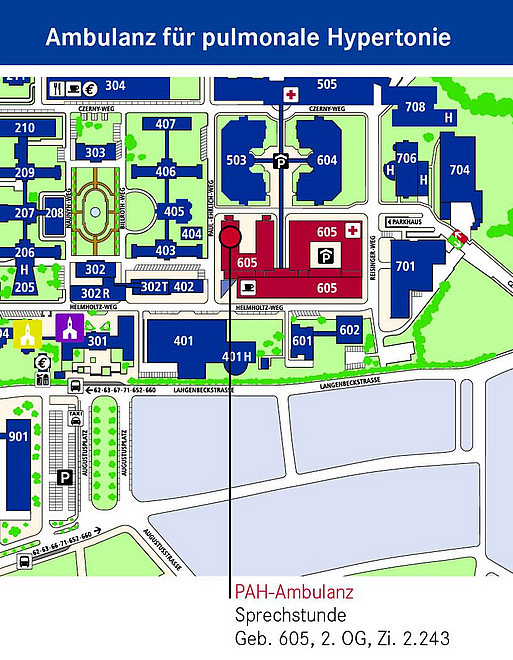PH Centre (focus on pulmonary hypertension)
Pulmonary hypertension (PH) consultation at the University Medical Center Mainz is provided jointly by the Department of Cardiology I (Director: Prof. T. Münzel) and the CTH. Diseases of the pulmonary circulation, particularly PH, often cause atypical symptoms and can thus remain undetected and untreated for many years. Untreated PH can have serious consequences for the quality of life and the life expectancy of these patients.
PH is not a disease itself, but the hemodynamic result of a variety of heart, lung or systemic illnesses. In the majority of the cases, PH is secondary to severe left heart failure or chronic lung disease. In some patients however, PH may be due to a primary disease of the pulmonary vessels called pulmonary arterial hypertension (PAH). In these patients, the wall of the small pulmonary artery branches thickens, causing obstruction to blood flow, pressure overload of the right heart chambers and right heart failure. PH may also develop in patients who have suffered one or more episodes of pulmonary embolism, if the blood clots fail to dissolve but persist and continue to obstruct smaller and larger lung vessels; this condition is termed chronic thromboembolic pulmonary hypertension (CTEPH).
Effective drugs (prostanoids or prostanoid receptor agonists, endothelin receptor antagonists, and phosphodiesterase inhibitors) have been developed and can help to treat PAH effectively over many years. Certain patients with CTEPH can profit from surgical or percutaneous catheter-directed therapy.
After having documented the patient’s clinical symptoms and assessed the severity of functional limitation, we perform a complete PH diagnostic work-up. The first-line screening test is echocardiography (heart ultrasound). If signs of right heart pressure overload and failure are detected, a comprehensive set of examinations follows. This includes laboratory and functional tests as well as imaging methods, followed by hospitalization to perform right heart catheterization. As soon as the diagnosis is confirmed and the type of PH determined, appropriate general measures (oxygen, diuretics, anticoagulants) are taken and specific medical or surgical/interventional therapy is provided following consultation with experts from all disciplines involved. All patients are systematically followed at our specialized PH outpatient clinic.
PH is not a disease itself, but the hemodynamic result of a variety of heart, lung or systemic illnesses. In the majority of the cases, PH is secondary to severe left heart failure or chronic lung disease. In some patients however, PH may be due to a primary disease of the pulmonary vessels called pulmonary arterial hypertension (PAH). In these patients, the wall of the small pulmonary artery branches thickens, causing obstruction to blood flow, pressure overload of the right heart chambers and right heart failure. PH may also develop in patients who have suffered one or more episodes of pulmonary embolism, if the blood clots fail to dissolve but persist and continue to obstruct smaller and larger lung vessels; this condition is termed chronic thromboembolic pulmonary hypertension (CTEPH).
Effective drugs (prostanoids or prostanoid receptor agonists, endothelin receptor antagonists, and phosphodiesterase inhibitors) have been developed and can help to treat PAH effectively over many years. Certain patients with CTEPH can profit from surgical or percutaneous catheter-directed therapy.
After having documented the patient’s clinical symptoms and assessed the severity of functional limitation, we perform a complete PH diagnostic work-up. The first-line screening test is echocardiography (heart ultrasound). If signs of right heart pressure overload and failure are detected, a comprehensive set of examinations follows. This includes laboratory and functional tests as well as imaging methods, followed by hospitalization to perform right heart catheterization. As soon as the diagnosis is confirmed and the type of PH determined, appropriate general measures (oxygen, diuretics, anticoagulants) are taken and specific medical or surgical/interventional therapy is provided following consultation with experts from all disciplines involved. All patients are systematically followed at our specialized PH outpatient clinic.
How to reach us:
To arrange a personal appointment, please contact our office directly.Phone: 06131 17-2995 (Mon. - Thur. 7:30 a.m. -11:30 a.m.)
E-Mail: pah-ambulanz@unimedizin-mainz.de
Fax: 06131 17-6613
How to find us:
University Medical Center MainzCardiology 1 / Center for Thrombosis and Hemostasis
Building 605, 2nd floor
Langenbeckstasse 1
D-55131 Mainz

Head of outpatient services

Professor Stavros Konstantinides, MD
Internal Medicine, Cardiology
Medical Director CTH
Doctors

Kai-Helge Schmidt, MD, PhD
Senior physician, Cardiology I
Research Associate


